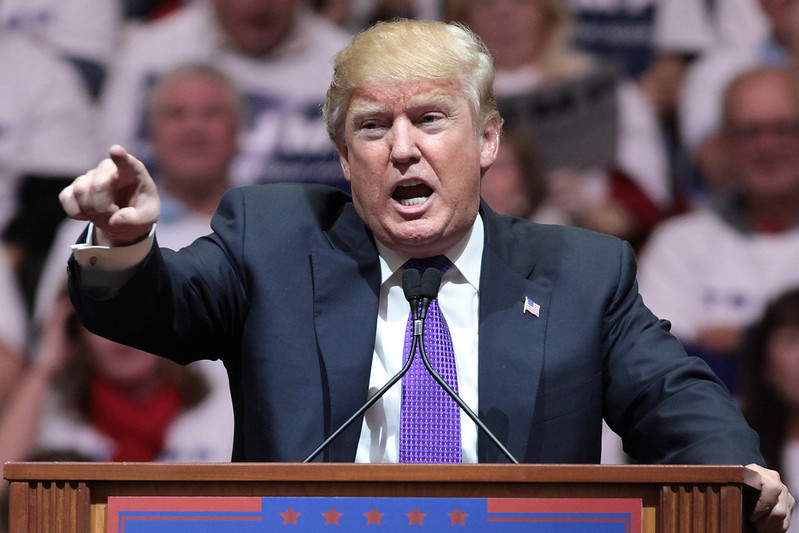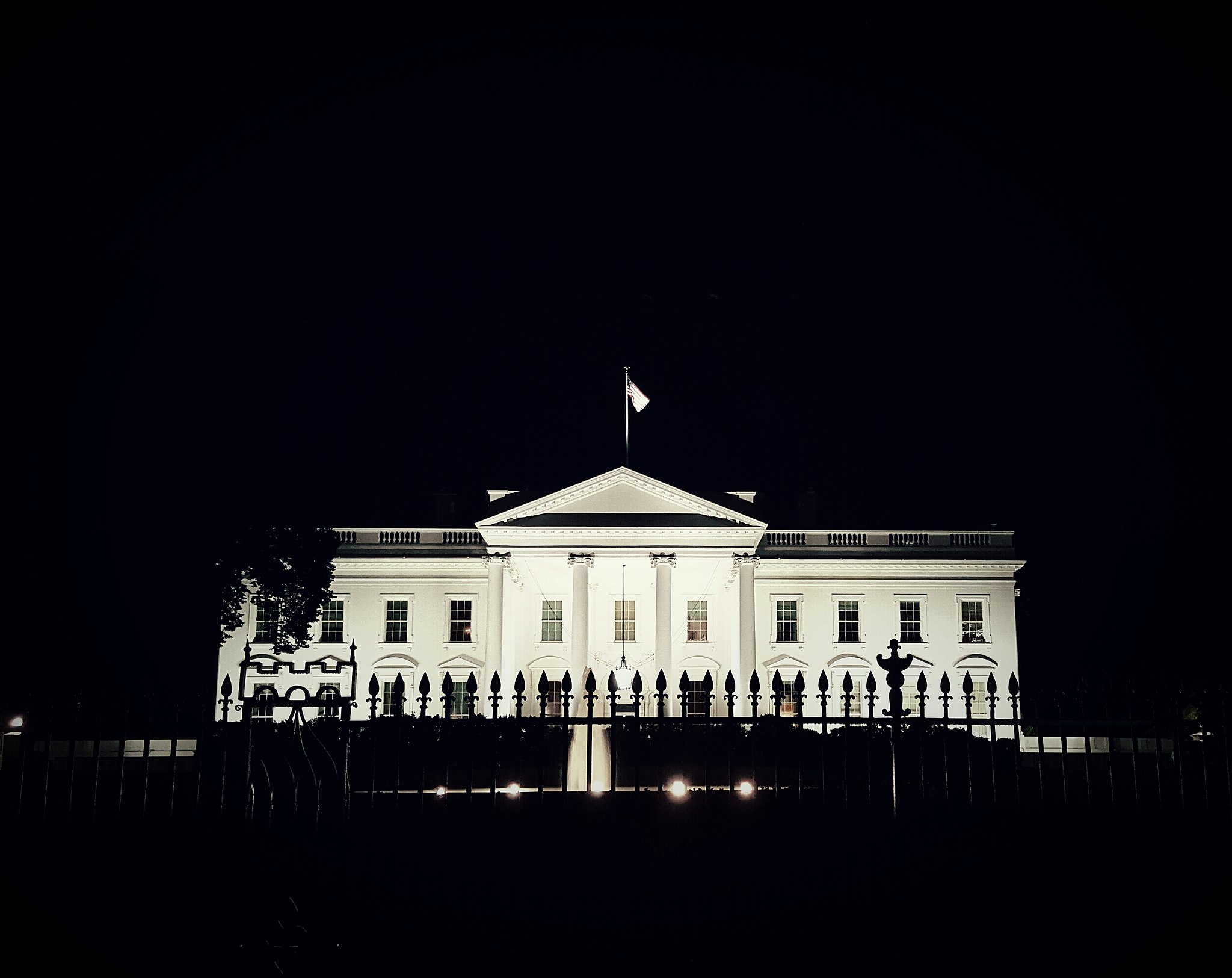Cassidy Hutchinson’s Testimony Changed Our Minds About Indicting Donald Trump
Hutchinson’s testimony on former President Trump’s comments during Jan. 6 serve as additional proof of intent and context, and—crucially—a material act to increase the likelihood of violence.

Published by The Lawfare Institute
in Cooperation With

Until Tuesday, we had both publicly statedthat the Department of Justice had insufficient evidence to indict former President Trump for his conduct on Jan. 6. Our conclusion, which we each came to independently, was largely grounded in First Amendment concerns about criminalizing purely political speech.
But Tuesday’s explosive testimony from Cassidy Hutchinson, a former aide to Trump’s chief of staff, Mark Meadows, changed our minds. In particular, Hutchinson testified to hearing Trump order that the magnetometers (metal detectors) used to keep armed people away from the president be removed: “I don’t fucking care that they have weapons, they’re not here to hurt me. They’re not here to hurt me. Take the fucking mags [magnetometers] away. Let my people in. They can march to the Capitol from here; let the people in and take the mags away.”
Admittedly, Hutchinson is only one witness, and it is true that some of her testimony would, in the context of a criminal trial, constitute hearsay. But Hutchinson—unlike many of her detractors who have contested certain details of her testimony—testified under oath and, contrary to the sneering commentaryof the House Judiciary Committee GOP Twitter account, not all of Hutchinson’s second-hand remarks were introduced to establish the truth of the matter asserted. Even much of that portion of her testimony that did constitute hearsay might still be admissible under the relevant evidentiary rules.
These utterances by Trump (as alleged by Hutchinson) were not political speech. They serve as additional proof of intent and context, and—crucially—a material act to increase the likelihood of violence. This easily distinguishes Trump’s speech at the rally from other kinds of core political speech that should never be criminalized.
Insufficient Evidence Before Tuesday’s Testimony
Let’s start with what was publicly known of Trump’s speech at the “Stop the Steal” rally at the White House Ellipse. Trump told the crowd, “I know that everyone here will soon be marching over to the Capitol building to peacefully and patriotically make your voices heard.” Then he added:
Now, it is up to Congress to confront this egregious assault on our democracy. And after this, we're going to walk down, and I'll be there with you, we're going to walk down… Because you'll never take back our country with weakness. You have to show strength and you have to be strong … And we fight. We fight like hell. And if you don't fight like hell, you're not going to have a country anymore … So we're going to, we're going to walk down Pennsylvania Avenue ... And we're going to the Capitol, and we're going to try and give … give our Republicans … the kind of pride and boldness that they need to take back our country.
Hindsight is 20/20, and before Tuesday, we both believed that hindsight bias was causing too many commentators to leap from Trump’s remarks to the violence that followed, and that a criminal prosecution of the speech itself would run afoul of foundational principles of First Amendment law. In particular, we were skeptical that Trump’s speech would satisfy the stringent requirement of Brandenburg v. Ohio, the landmark case in which the Supreme Court held that the government could only criminalize speech advocating unlawful action if “such advocacy is directed to inciting or producing imminent lawless action and is likely to incite or produce such action.” Although Trump’s speech was undoubtedly a but-for cause of the violence, the content of the speech itself is hard to distinguish from other politicians or activists who may call on supporters to “fight like hell” or “march to the Capitol” or any other government building for a political purpose.
Indeed, this is why we disagreed with D.C. District Judge Amit Mehta’s February ruling, in a civil case brought against Trump, that held that the content of Trump’s speech was not protected by the First Amendment. Our concern was that if prosecutors could indict Trump for the content of his speech alone they could also indict lower-profile politicians and even community activists and organizers for such common rhetoric—especially if a crowd independently got out of control, and especially in parts of the country wanting to suppress certain kinds of political speech. Indicting just on the content of the speech would have set a bad precedent. If only for this reason alone,we both agreed with Jack Goldsmith’s analysisin the New York Times explaining why indictments were problematic.
Incitement to Riot
18 U.S.C. § 2101applies to anyone who, with intent to “incite a riot” or “organize, promote, [or] encourage ... a riot ... performs or attempts to perform any other overt act” to incite, organize, etc., a riot.
Let’s start with the intent requirement. We believe that, if presented in a criminal trial, Hutchinson’s testimony would establish that Trump was at the very least willfully blindto the possibility of, and—as seems increasingly plausible—actively in favor of, the crowd causing violence at the Capitol. According to Hutchinson, Trump was told by numerous White House officials, including his deputy chief of staff (and former lead Secret Service agent), about the danger that the crowd posed. Trump refused to defuse the situation despite multiple desperate entreaties from his staff. Hutchinson even added a new dimension to Trump’s already notorious endangerment of Vice President Mike Pence—previously expressed via tweet—stating that she heard Trump say Pence deserved the mob’s calls to hang him. This testimony, in combination with Trump’s assertion that “Mike Pence didn't have the courage to do what should have been done to protect our Country and our Constitution,” which he tweeted while the rioters roamed the Capitol chanting, “Hang Mike Pence,” makes it difficult to maintain that Trump’s speech and surrounding conduct was intended merely to express his political views.
But intent by itself is not enough; as both a legal and a prudential matter, the case for prosecuting political speech is much stronger when that speech is accompanied by additional actions that facilitate lawlessness and violence, just as the crime of conspiracy requires an overt actto avoid the over-criminalization of loose talk.
And it is here that Hutchinson’s testimony about Trump’s angry demand to remove the magnetometers is critical, because that order, were it to have been followed, would have brought the most dangerous members of that crowd closer to him and arguably would have made them more likely to be moved by his inflammatory rhetoric. Even if those armed supporters could hear him from a distance when they were staying back from the “mags,” Trump clearly wanted a larger and a more fired-up rally. A larger, more packed crowd that could hear at higher volume, that could see Trump better, and that was part of a denser mob, with more of his most hard-core followers with weapons and body armor, would be more likely to march and fight physically, not just metaphorically. Trump would have been aware of this likelihood, and he tried materially to increase this likelihood.
In other words, Trump’s order to “take the fucking mags away,” whether or not the Secret Service obeyed it, was not constitutionally protected political speech but, rather, an overt act, sandwiched between sentences reflecting awareness and intent, that would have made the threat of lawlessness far more “imminent” (in the language of Brandenburg). Trump’s actions transformed his words “Fight like hell” from a political metaphor to a consciously literal and imminent danger.
Using Trump’s order as a key element in his criminal prosecution thus offers a safeguard to prevent the case against Trump from being used as a precedent to criminalize loose political talk. A leader or an activist who simply called on a crowd to “fight like hell” and “march to the Capitol” would not be liable to prosecution for incitement under the above logic. By contrast, a leader or an activist who distributed weapons, knives, spears, bear spray, and body armor to a mob of activists, and then immediately fired them up about an imminent government conspiracy, and called on them to “fight like hell” and “march to the Capitol” would—and we think should—be subject to prosecution for incitement. By ordering the removal of the magnetometers, Trump acted in a way that would have increased the dangerousness of the crowd, and so he too should be held accountable for incitement.
Obstruction of Congress
For similar reasons, Tuesday’s testimony bolsters the case for a prosecution under 18 U.S.C. 1512(c)(2), which applies to anyone who “corruptly, obstructs, influences, or impedes any official proceeding, or attempts to do so.” This charge, which has been used in hundredsof prosecutions related to Jan. 6, has also been central to how Liz Cheney, the House select committee’s vice chair, has described Trump’s conduct. (See also the related crimeof obstructing a congressional committee or inquiry.)
Section 1512(c)(2) requires “corrupt” intent. Before Tuesday, Trump’s defense was that he was simply telling his supporters to go to the Capitol to protest peacefully. But after Hutchinson’s testimony, it is clear that he knew (or believed) that he was sending a heavily armed and potentially violent crowd to the Capitol that was almost inevitably going to disrupt and impede Congress’s proceedings. One reference to “peaceful” protest does not negate the increasing mountain of evidence demonstrating that Trump, at the very least, knew about and was deliberately indifferent to the danger that the mob posed and quite possibly wanted them to violently storm the Capitol.
Trump’s speech, his attempt to remove the magnetometers, his refusal to intervene when the rioters entered the Capitol, and the inflammatory tweet he sent about Pence despite being told of what was going on all show that Trump intended and acted so as to “endeavor to influence, obstruct, or impede” Congress’s certification of the Electoral College vote, all to corruptly cling to power.
Insurrection and Seditious Conspiracy
The federal insurrection statute, 18 U.S.C. § 2383, applies to “[w]hoever incites, sets on foot, assists, or engages in any rebellion or insurrection against the authority of the United States or the laws thereof, or gives aid or comfort thereto.”
Before Tuesday, it seemed like hyperbole to suggest charging Trump with insurrection. But once a prima facie case has been made to charge Trump with inciting a riot and with obstructing Congress, the case for an insurrection charge follows logically. After all, what is an insurrection against Congress but a violent riot with the intent to obstruct Congress’s most solemn duty: facilitating the peaceful transition of power?
Indeed, not only is insurrection on the table after Tuesday, but so is the related crime of seditious conspiracy,which occurs when “two or more persons ... conspire to overthrow, put down, or to destroy by force the Government of the United States, or to levy war against them, or to oppose by force the authority thereof, or by force to prevent, hinder, or delay the execution of any law of the United States.” In this context, to commit insurrection is also to commit sedition. Prosecutors already have chargedleaders of the Oath Keepers and the Proud Boys with seditious conspiracy. Although seditious conspiracy requires an independent finding of conspiracy, which Tuesday’s testimony did not establish, the Jan. 6 committee has promised to offer evidence of contacts between the rioters and the White House. If those contacts reach Trump, a charge of seditious conspiracy becomes substantially more likely.
DOJ’s Changed Calculus
So far, we have addressed the legal case for holding Trump criminally accountable for the violence of Jan. 6. But for a prosecution to be legitimate, it is not enough that the prosecutor believes that the law and the facts are on their side. The prosecutor must also concludethat “the decision to charge is in the interests of justice.” At the federal level, this means that a prosecutor should bring charges unless“(1) the prosecution would serve no substantial federal interest; (2) the person is subject to effective prosecution in another jurisdiction; or (3) there exists an adequate non-criminal alternative to prosecution.” The second requirement does not apply in this case because the actions at issue took place in Washington, D.C., the nation’s capital and a federal enclave. So the question is whether a prosecution of Trump would serve a substantial federal interest and whether there exist adequate alternatives to prosecution.
We think the answers to these questions are yes and no. Beside the general interest in enforcing federal criminal law, a prosecution of Trump would accomplish three important purposes. First, it would send a clear message that no one, not even the president, is above the law. This, unfortunately, is not a fringe position. From former President Richard Nixon’s statementthat “[w]hen the president does it … that means that it is not illegal,” to Trump’s claimthat “I have an Article II, where I have the right to do whatever I want as president,” the poisonous idea of an extralegal president has posed an increasing threat to American democracy. A criminal prosecution would go a long way toward countering that threat.
Second, a prosecution would deter future presidents, and their enablers, from engaging in the sort of extreme, anti-democratic conduct that Trump embraced. Of course, deterrence can go too far, and it is a legitimate concern to worry about creating an overly cautious and risk-averse executive. But just because a prosecution would have chilling effects doesn’t mean that all chilling effects are bad. We wantfuture presidents to err well on the side of respecting the democratic process: extra caution is no bad thing.
Finally, and perhaps most controversially, a prosecution could serve criminal law’s goal of incapacitating criminals. We do not take a position on whether prosecution would necessarily mean incarceration, and one of us has previously argued against putting Trump in prison.A criminal penalty could be limited to a large fine. It could be used by Congress as the basis for impeachment and Senate disqualification or disqualification by Section 3 of the 14th Amendment. However, we also think it is important to recognize some of the benefits of equality before the law. Our legal system should treat ex-presidents who have committed violent felonies the same way it treats other citizens who commit violent felonies. In our society, violent felons tend to serve time in jail, and incitement and insurrection are crimes of violence, in which people were killed and badly injured. After Tuesday, the case for Trump to face equal justice is increasingly strong on a moral and retributive basis as well as on a deterrence basis. Given Trump’s repeated invocations of the “big lie,” there is no reason to think that he has learned any sort of lesson, and he remains popular among his base and continues to be enabled by Republican politicians across the country and in Washington. The ordinary political process seems unable to deal with Trump, so there is no “adequate non-criminal alternative to prosecution.”
We recognize the radical implications of this last point. It’s essentially a call to allow political considerations to enter into what should ordinarily be completely removed from politics: the weighty responsibilities of the federal prosecutor. But when we’re talking about the president of the United States committing not just crimes but attacking the very foundation of democratic government, there’s no way to cleanly separate law from politics. And while indicting a former president who remains the frontrunner for his party’s presidential nomination will no doubt do immense short-term damage to American political stability and raise some potential separation-of-powers issues, the alternative—to allow American democracy to be attacked literally from within and from the very top—is even worse.
Trump, as he so often does, has left the country facing a painful dilemma. Attorney General Merrick Garland has no good options, only bad ones. But the bad options are not all equally bad. While we certainly don’t envy Garland and the difficult decision he has to make, we think that, after Tuesday’s testimony, letting Trump off the hook poses a greater threat to American democracy than does prosecuting him.






